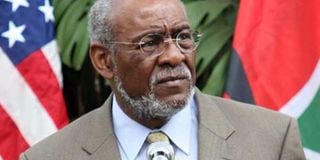He came and lectured us on things we already know, but I do not feel hurt

Former US Assistant Secretary of State, Johnnie Carson. Both Uhuru Kenyatta and William Ruto mobilised that narrative in their fight against the ICC and directed their arsenal against Carson who dared to suggest that choices have consequences. FILE PHOTO | NATION MEDIA GROUP
What you need to know:
- I know the sensitivity in Africa about being lectured by those who have presided over imperial powers.
- Indeed, both Uhuru Kenyatta and William Ruto mobilised that narrative in their fight against the ICC.
- In fact, they directed their arsenal against Johnnie Carson, who, as Assistant Secretary, dared to suggest that choices have consequences.
- Dr Mutua makes me wish I had a formula on how to lose all sense of shame.
Before President Barack Obama departed for Nairobi, the American talk show host, Tavis Smiley, interviewed a former Assistant Secretary of State, Johnnie Carson, on the upcoming trip.
Tavis, together with Dr Cornel West, are well-known critics of President Obama.
Tavis pointed to President Obama’s penchant for lecturing the black community in the US and regretted that he seems to have a base that supports him even when he talks down at them.
I know the sensitivity in Africa about being lectured by those who have presided over imperial powers.
Indeed, both Uhuru Kenyatta and William Ruto mobilised that narrative in their fight against the ICC.
CHOICES HAVE CONSEQUENCES
In fact, they directed their arsenal against Johnnie Carson, who, as Assistant Secretary, dared to suggest that choices have consequences.
It was interesting observing Kenyan leaders milling around President Obama.
Obama came and lectured us on everything we already know.
Indeed, he lectured us like no previous president of the US has done in recent memory.
From castigating corruption, nepotism and the persistently debilitating gendered and regional inequalities to nudging us on our commitments to human rights and democracy, Obama summoned both his filial ties with Kenya and his stature as President of the US to deliver tough love.
It was interesting observing the body language of our leaders, a good many of whom have a totally inconsistent record on all of the above issues.
Of course, we all recall the moment with civil society groups when Obama referred to his response to an opposition leader who asked the US to pressure the Jubilee government more.
REBUKED THE US
He reminded the leader that only a few years ago when he/she was in government, he/she had rebuked the US for interfering in internal Kenyan affairs.
Many have referred to this to conclude that Obama endorsed the Jubilee government and that the opposition lost out completely. I beg to differ.
Virtually all our top leaders, be they in government or opposition, have a contradictory record of opportunistically engaging external actors where Kenyan politics is involved.
I have made reference to the dismissals President Kenyatta and William Ruto sustained against major western powers in their quest for election and their fight against the ICC.
Theirs went the full hog of threatening to change Kenya’s foreign policy to focus East.
But nothing beats the sight of Dr Alfred Mutua, he of the “junior Senator from Illinois” fame, firmly shaking Obama’s hand.
I would have given everything to eavesdrop on the small talk he was making with the former ‘junior senator’.
ALFRED MUTUA
Dr Mutua makes me wish I had a formula on how to lose all sense of shame.
But the one thing I now know is that excessive exuberance is a dangerous thing whether you blame it on blind ambition, youthfulness, or sheer stupidity.
And my hope is that there has been a lesson in this for opposition politicians like Moses Wetang’ula, whose recorded video dismissing Johnnie Carson almost went viral by Kenyan standards.
But what seems lost to Kenyans is the broad context that President Obama’s rebuke points to.
The inconsistency of our politicians emanates from their mobility.
This mobility does not allow them to distinguish between the government and opposition.
Most are driven by raw power and nothing else; their desire is never to articulate a position but to jostle for raw power.
The consequence is that they treat political parties like matatus, to borrow from Kiraitu Murungi’s infamous analogy.
Thus, it matters less what the politicians say, more where they stand at the particular moment when they speak.
Political ‘turncoatism’ is the cancer that ails our politics.
It is for this reason I am happy that President Obama spoke directly and firmly and did not seem unduly distracted by any appearance of speaking down to us.





